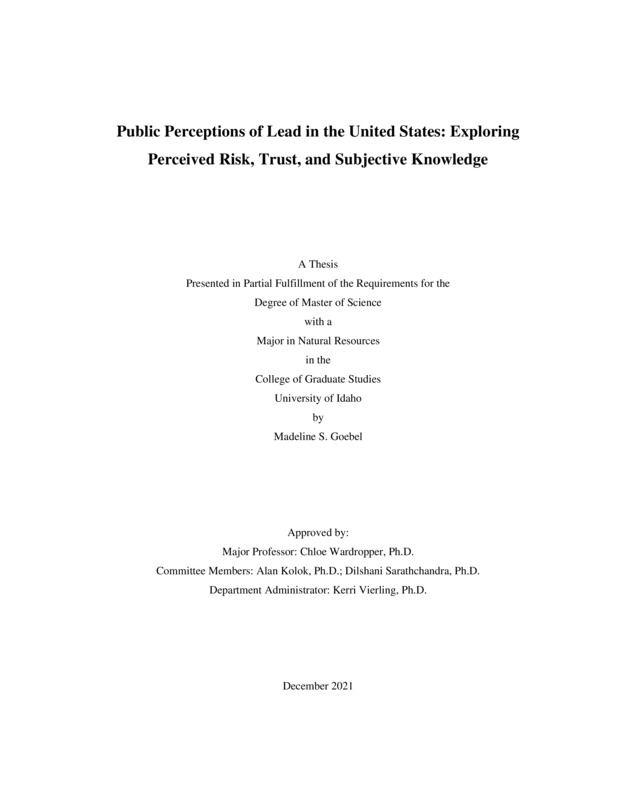Public Perceptions of Lead in the United States: Exploring Perceived Risk, Trust, and Subjective Knowledge
Goebel, Madeline Sarah. (2021-12). Public Perceptions of Lead in the United States: Exploring Perceived Risk, Trust, and Subjective Knowledge. Theses and Dissertations Collection, University of Idaho Library Digital Collections. https://www.lib.uidaho.edu/digital/etd/items/goebel_idaho_0089n_12232.html
- Title:
- Public Perceptions of Lead in the United States: Exploring Perceived Risk, Trust, and Subjective Knowledge
- Author:
- Goebel, Madeline Sarah
- Date:
- 2021-12
- Keywords:
- lead Pb risk perception subjective knowledge trust
- Program:
- Natural Resources
- Subject Category:
- Environmental health; Social research
- Abstract:
-
Lead exposure remains a pertinent public health issue in the United States (U.S.) despite multiple policies and regulations to control sources of lead in the environment. Existing social science research on human interactions with lead has primarily focused on at-risk population groups and areas with high levels of contamination. As such, little is known about perceptions of lead for a cross-section of the public, which can contribute to improved health protective remediation and messaging. This research contributes to a broader understanding of public perceptions of lead in the U.S. using data from a national online survey of U.S. residents (n = 1,035). In the first chapter, I 1) compare the perceived risk of lead exposure to other common environmental risks and 2) explore the relationships between trust in government management of lead, subjective knowledge about lead, and the perceived risk of lead exposure. Results reveal that lead exposure is perceived to be less risky than air pollution, pollution of rivers and lakes, climate change, and habitat loss. Our regression analyses indicate that both trust in government management of lead and subjective knowledge about lead significantly and positively predict perceptions of lead exposure risk. When considering the potentially moderating effect of subjective knowledge, I found evidence contradicting past findings that trust is a stronger predictor of perceived risk when knowledge is low. In the second chapter, I further investigate trust in government management of lead as a function of reliance and skepticism. Reliance is defined as the general trustworthiness of a risk management entity. Skepticism refers to the existence of any doubtful views regarding the risk management entity and how risk policies are enacted. We first categorize respondents into four different groups related to their level of trust in government management of lead – rejection, distrust, critical trust, and acceptance – based on levels of reliance and skepticism. We then examine predictors of group membership using sociodemographic, environmental, and other variables including trust in scientists and subjective knowledge. Findings indicate that a majority of respondents demonstrate high levels of skepticism in government management of lead. I discuss implications for results from Chapters 1 and 2 in the broader context of lead risk management in the U.S and opportunities for future research.
- Description:
- masters, M.S., Natural Resources -- University of Idaho - College of Graduate Studies, 2021-12
- Major Professor:
- Wardropper, Chloe B
- Committee:
- Kolok, Alan; Sarathchandra, Dilshani; Veerling, Kerri
- Defense Date:
- 2021-12
- Identifier:
- Goebel_idaho_0089N_12232
- Type:
- Text
- Format Original:
- Format:
- application/pdf
- Rights:
- In Copyright - Educational Use Permitted. For more information, please contact University of Idaho Library Special Collections and Archives Department at libspec@uidaho.edu.
- Standardized Rights:
- http://rightsstatements.org/vocab/InC-EDU/1.0/

